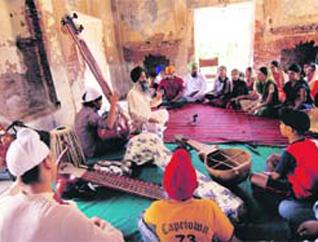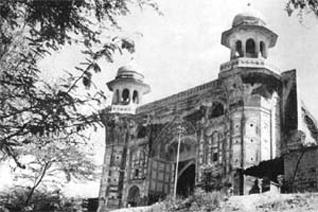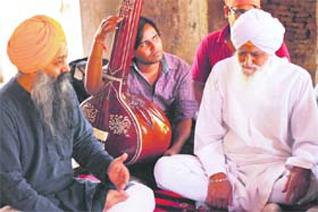
Above: Bhai Baldeep Singh holds an inaugural class. Below, first from bottom: Class instruction by Bhai Baldeep Singh (left) and Bhai Gurcharan Singh (right). Both photos are by Antonio Dolce.


Music
Qila Sarai, Sultanpur Lodi:
Reclaiming Our Musical Legacy
by VANDANA SHUKLA
Sultanpur Lodhi, Punjab
On a Sunday morning, the Darbar Hall inside the police station reverberates with musical notes of the rebab, taus and raag asavari. For an auspicious beginning, Bhai Gurcharan Singh Raagi, 96, eleventh generation exponent of gurbani kirtan, delivers the first pure note. When about 50 enthusiastic lovers of music - young and old - render alaap, the precarious walls of the qila vibrate.
The hall is an apology, and the prefix "darbar" adds only to its irony. Bricks pop out of the naked walls, part of the roof is missing, compensating for sky light, and plaster peels off, making room for plants to sprout. But, then, history has been unforgiving in this part of the land. And, time has taken the remaining glory in its sweep. Yet, amidst tall neglected grass, grown a golden hue with heat and dehydration, a little holly hock plant blossoms in full glory, defying laws of germination.
So, does Qila Sarai, with people's aspiration and hunger for a cultural life, thus far neglected.
After years of persuasion, Anad Conservatory has been able to get a grant of Rs. 20 million from the Government of Punjab to conserve the sarai and open an academy of devotional music. The government has also allotted land to house the existing police post which will be shifted from the qila.
Interestingly, among the many keen students of music, is Constable Kuldeep Singh, who rushes for the class after finishing his duty. He persuaded Bhai Baldeep, founder Chairman, Anad Conservatory, to take him as a disciple because, "All the Gurus found their salvation in the purity of music. I too wish to follow their path," he pleads.
Kuldeep wants to be taught pure raags, though, he can sing folk with great élan. He is not alone. Several music teachers from the vicinity have come back as students to get what degrees in music could not give them - knowledge and a connection with gurbani.
It is a new approach to culture and heritage. The knowledge that belongs to the people is being handed over to them, in a setting that befits the knowledge.
"The idea is to rediscover the original institution of Qila Sarai. It was part of great sarai tradition that existed on the Agra-Lahore route," says Prof. Rabindra Vasavada, who is on the panel of scientific advisory committee on conservation headed by Prof. Paolo Ceccarelli, to restore the sarai.
The sarai was originally built by Sultan Khan Lodhi in the 12th century and was rebuilt by Emperor Shah Jehan in the 16th century. Dara Shikoh and Aurangzeb studied Islam at Sultanpur Lodhi. The place finds a mention in Aina-e-Aakbari.
Above all, it was here at the River Kali Bein where Guru Nanak disappeared for a while to emerge with the mool mantra. Bhai Firanda, the rebabi, met him here and it was here that Guru Nanak gave a gift of strings to Bhai Mardana. The small town has seven gurdwaras, all steeped in history.
Classes are held in classical music based on devotional music of Punjab and India. The faculty includes Pt Asit Banerjee (rudra veena), Somji Dasgupta (sarod and rebab), Pt Indra Keshav Mishra (dhrupad) and Ashutosh Upadhyaya (pakhawaj). A beginning is made with Gurmat Sangeet which is part of the heritage of this region.
"From Baba Farid to Guru Gobind Singh, all the Gurus as well as the Bhagats of Guru Granth Sahib used to sing the bani before they penned it ... which stands for a perfect harmony between laya, taal, shabad and its meaning," explains Bhai Baldeep to a class overflowing with students. One cannot ignore the community's participation in the project - someone brings breakfast, another cooks lunch for the faculty and guests.
Everybody is put up for stay in local gurdwaras. It is a small town where facilities are not adequate. But, passion for music takes care of the rest.
[Courtesy: Tribune]
May 16, 2011
Conversation about this article
1: Sangat Singh (Kuala Lumpur, Malaysia), May 16, 2011, 9:24 AM.
This is the resurrection and re-awakening from a deep slumber. May you go from strength to strength and restore Gurmat Sangeet to its pristine timbre. When Guru Nanak first heard Bhai Mardana, He said to him: "You play well, come with me, we will combine Shabad with it to feed the souls and make it eternal and a nirmolak hira to help wash away dirt from of the souls." - "Gun gaavat tayree utras mail" [GGS:289.2]
2: Bhai Baldeep Singh (Sultanpur Lodhi, Punjab), May 20, 2011, 5:21 AM.
The 'saranda' thumb-nail image is of a recently designed hybrid (between a sarangi and saranda), which I call by the name, 'sarangi-da'.


